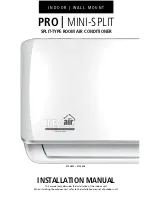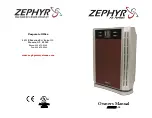
General information
Product description
The models P08/P12/P15/P20/P30 are a range of specifically
developed air/water heat pumps designed for energy
efficient heating of swimming pools or spa pools. The models
have been developed and designed for the Scandinavian
climate. The pool heat pumps are designed to work with
good efficiency and a low noise level.
All models feature:
•
Titanium heat exchangers resistant to chlorine and salt
water
•
Environmentally friendly and effective coolant (R410a)
•
Digital LED control
•
Dynamic defrosting function for an extended pool
season
•
Flow switch and union couplings for safe operation and
easy installation
Functional principle
The pool heat pumps P08/P12/P15/P20/P30 are primarily
used for heating, but can also be used for cooling. The
models are controlled via a flow switch and in order to work
the pool’s circulation pump must be running.
The pool heat pump works with the greatest energy
efficiency when there are small differences in temperature
between the inlet and outlet. The recommendation is 1-2
degrees difference between the inlet and outlet. The water
flow is regulated via a bypass coupling. Read more about the
bypass coupling in section 2 – Installation.
All models are developed to guarantee good efficiency in
the Nordic climate. However, it is important to be aware that
the degree of efficiency is dependent on the surrounding
outdoor temperature and the temperature of the pool
water. The heat pump can be seen to perform with different
efficiency during different parts of the year depending on
the outdoor conditions. At the start of the season, when
the water in the pool is cold, the heat pump needs to
work continuously for a long period to produce the right
temperature in the pool. When the pool water has reached
the required temperature, the heat pump automatically stops
and starts as required. It is always cost-effective to cover the
pool when not in use, especially at night. Approximately 60
– 70 % of the heat disappears from the water surface of the
pool. Covering also reduces the heat pump’s running time.
The heat pump must always be installed outdoors, as it
collects its energy from the surrounding air. It must be well
ventilated and must not be enclosed or in any other way
shielded so the air circulation is impaired. The circulation of
the air between the intake and exhaust impairs efficiency.
Avoid installation close to sensitive walls, for example,
bedroom rooms.
Frost or ice can form on the heat pump’s evaporator. This is
completely normal. An automatic defrosting cycle will start to
melt the ice. After the defrosting cycle the heat pump starts
its standard program and continues to heat the pool.
The models are designed for pool heating during May to
September, which can be considered as a normal pool
season.
This chapter provides background information about the pool heat pumps covered in this Installation and Maintenance Guide.
Important information, guarantee conditions and safety instructions are also presented here. This chapter is intended for both users
and installation engineers.
1
4
POOL
Refer to the labels on the unit before connecting the inlet and outlet.
Chlorinator
Sand filter
Circulation pump


































